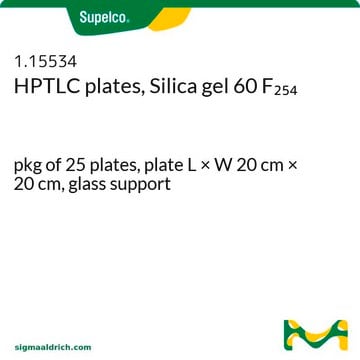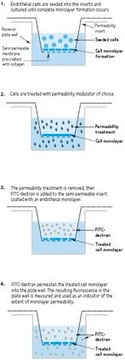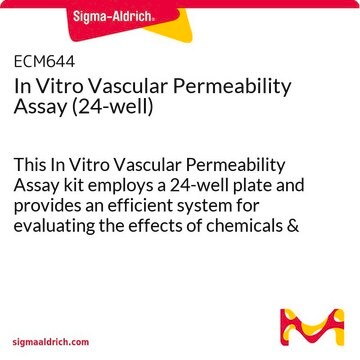1.05564
HPTLC plates, Silica gel 60 F₂₅₄ GLP
pkg of 25 plates, plate L × W 10 cm × 10 cm, glass support
Synonym(s):
High Performance TLC Silica Plates
Select a Size
About This Item
Recommended Products
material
glass support
silica gel 60 matrix
Quality Level
feature
binder Organic Polymer
fluorescent indicator
packaging
pkg of 25 plates
technique(s)
thin layer chromatography (TLC): suitable
layer thickness
250 μm
plate L × W
10 cm × 10 cm
particle size
5-6 μm
pore size
60 Å medium pore diameter
storage temp.
2-30°C
Related Categories
1 of 4
This Item | ECM810 | ECM642 | ECM644 |
|---|---|---|---|
| technique(s) activity assay: suitable, cell based assay: suitable | technique(s) cell based assay: suitable | technique(s) cell based assay: suitable | technique(s) cell based assay: suitable |
| manufacturer/tradename Chemicon® | manufacturer/tradename Chemicon® | manufacturer/tradename Chemicon® | manufacturer/tradename Chemicon® |
| Quality Level 100 | Quality Level 100 | Quality Level 100 | Quality Level 100 |
| shipped in dry ice | shipped in - | shipped in wet ice | shipped in wet ice |
General description
Analysis Note
Pore volume (N₂-isotherm): 0.74 - 0.84 ml/g
d 50 (laser diffraction, size distribution): 5 - 7 µm
Layer thickness: 150 - 200 µm
Deviation of layer thickness per plate: ≤ 35 µm
Chromatographic testings:
A) Colour test
hRf-values
- bleu vif organol, colour test, lipophile:
17 - 22
- Ceres Black G, colour test, lipophile: 38 - 43
- ceres Violet brn, colour test, lipophile: 58 - 64
separation number
- colourtest, lipophile:
≥ 10.0
B) Steriod test
hRf-values
- hydrocortisone, steroid test:
23 - 29
- Reichstein S, steroid test: 36 - 45
- methyltestosterone, steroid test: 43 - 52
separation number
- steroid test:
≥ 10.5
Typical value determined on a conditioned plate
Eluent A) Toluene (45% rel.humidity)
Eluent B) Ethyl acetate/Toluene (95+5 v/v; 20% rel.humidity)
related product
Certificates of Analysis (COA)
Search for Certificates of Analysis (COA) by entering the products Lot/Batch Number. Lot and Batch Numbers can be found on a product’s label following the words ‘Lot’ or ‘Batch’.
Already Own This Product?
Find documentation for the products that you have recently purchased in the Document Library.
Our team of scientists has experience in all areas of research including Life Science, Material Science, Chemical Synthesis, Chromatography, Analytical and many others.
Contact Technical Service









